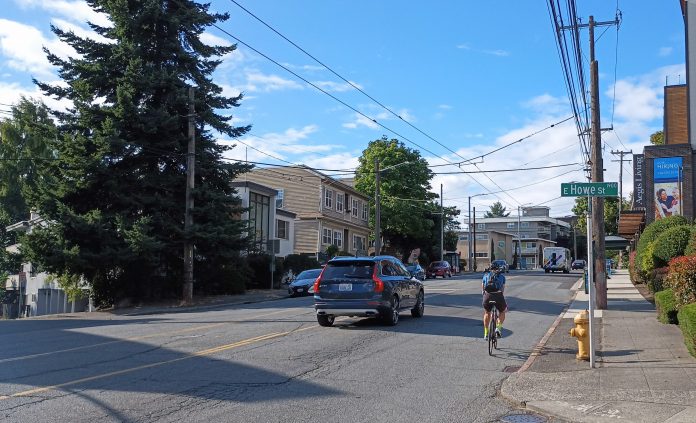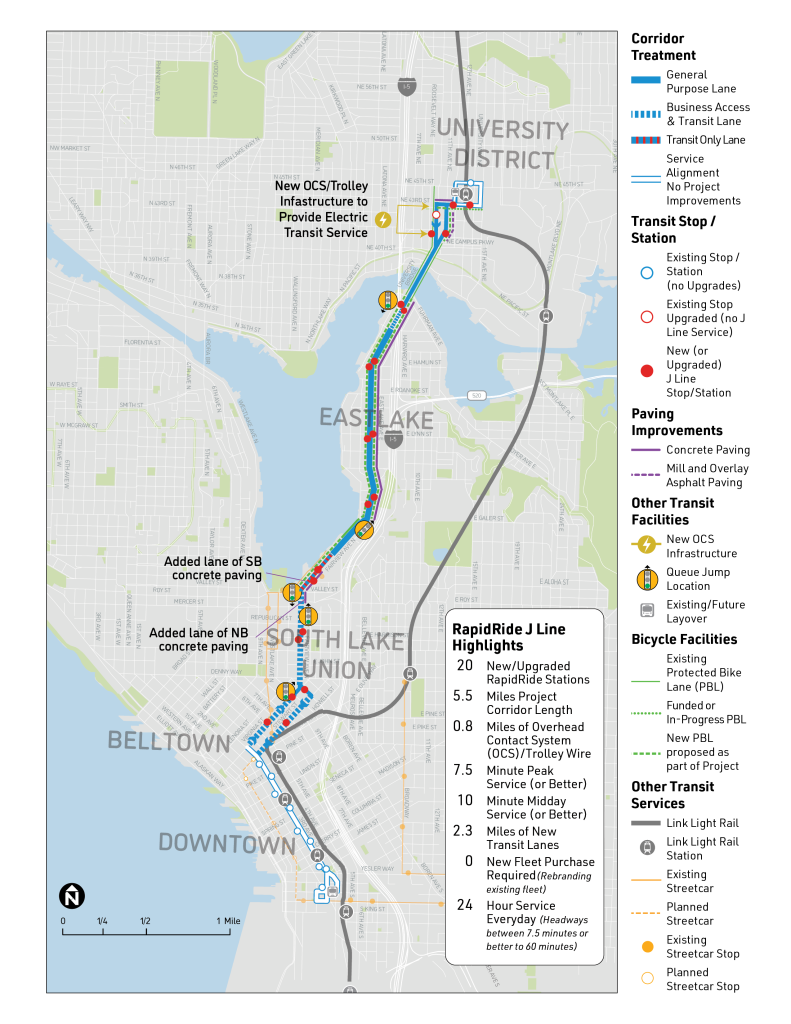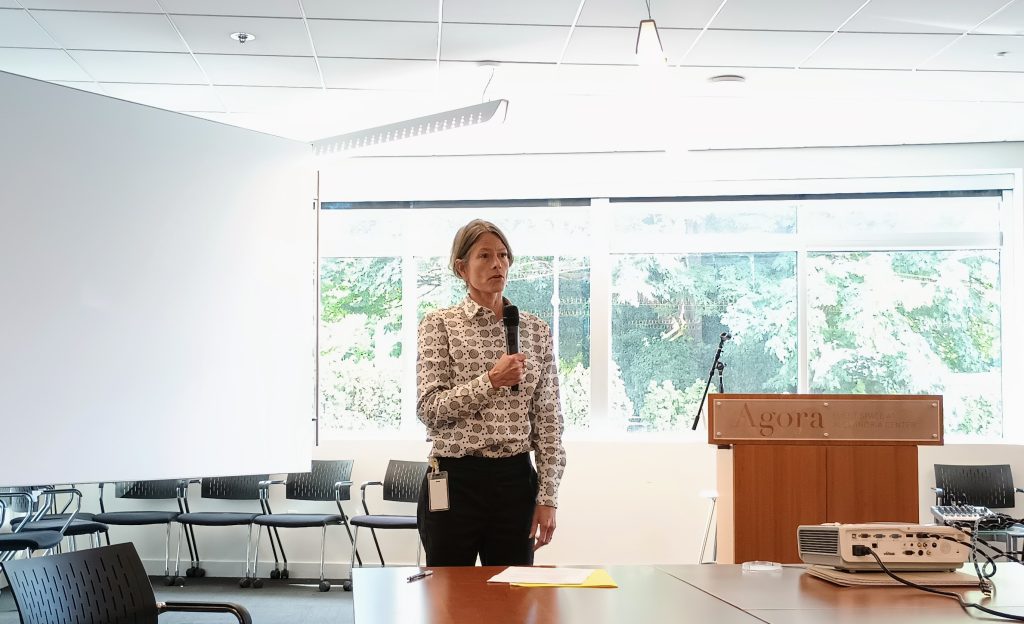
Four members of the Eastlake Community Council’s board were abruptly removed from their positions last week, following a disagreement over advocacy around a long-planned transportation project set to break ground in 2024. The RapidRide J line, which will connect downtown Seattle with U District Station as an upgrade to the existing Route 70, while also adding separated bike lanes to the length of Eastlake Avenue E, has been in planning since 2014 and is currently at 90% design completion. The street redesign has been the subject of intense pushback from business and property owners in the neighborhood who are concerned about a loss of on-street parking.
The board members’ ouster, via a five-to-four vote that had not been signaled beforehand, came on the heels of two letters sent to the City of Seattle earlier this month: one pushing back on the J Line, approved by six of the board’s members, including Community Council President Detra Segar, and another, approved among the four dissenting members, supporting the project and making clear the board was divided on the issue. The letter signed by the four dissenters did not purport to be providing the viewpoint of the full community council board.
“The city’s plan for Eastlake Avenue is a good one in the midst of competing priorities and difficult choices. RapidRide J-Line and protected bike lanes are needed as density in our urban village continues to grow,” the dissenting letter that led to the ouster vote read. “Protected bike lanes along both sides of Eastlake Avenue fulfill a long-desired bikeway in the city’s bike master plan that will promote and encourage sustainable travel such as bicycling, scootering, and skateboarding in Eastlake and Seattle as whole. Eastlake Avenue is currently unsafe for bicyclists, and it is the most direct route for motorists and bicyclists alike. It is time we allow bicyclists the same direct route that motorists have long enjoyed.”

That viewpoint is at odds with several years of advocacy from Segar and other board members framing the project as being extremely detrimental to the neighborhood. Last fall, Segar wrote to incoming SDOT Director Greg Spotts asking him to reassess the RapidRide J.
“Beyond the massive waste of taxpayer money and consequences to Eastlake Avenue as a mixed-use retail core, it is squandering the opportunity to positively address the flaws and failings of Seattle’s arterial-based Bike Master Plan,” she wrote, citing declining bike ridership numbers from 2018. “Seattle’s Bike Master Plan was conceived before e-bikes, e-scooters and e-unicycles. The Move Seattle vision seems to only see able-bodied peak hour commuters pedaling along arterials pretending to be the equals of buses and cars.”
Despite making the decision to route people on bikes away from major arterials in several areas of the city, Seattle leaders have defended the idea of adding protected bike lanes to Eastlake Avenue, after a comprehensive review looking at other alternatives came up short. “From the north end to downtown Seattle there are only a few routes you can go on, and so Eastlake is moving forward,” Mayor Jenny Durkan said in early 2020, less than a year after her administration cancelled planned bike lanes on 35th Avenue NE after community pushback.
The latest letter that set this all into motion seeks to influence the Harrell administration before the RapidRide J goes out to bid, and requests that the project’s funding be reallocated to “another more appropriate project in Seattle that would address fairness and equity,” calling the J Line “redundant” and “outdated.”
“Our neighborhood is being asked to accept a questionable design and now unnecessary Rapid Ride project while many neighborhoods are in need of more adequate transit service and federal funding to close their budget gaps,” the Eastlake Community Council letter reads.
The fully-funded RapidRide J includes a $60 million grant from the Federal Transit Administration, one that couldn’t be reallocated elsewhere if the project were cancelled or significantly modified. The letter does request that Eastlake Avenue E be repaved and its aging water main replaced, costs that are now bundled into the overall project.
“Opponents of [RapidRide J] have been really vocal,” Judy Smith, one of the four removed board members, told The Urbanist. “And it’s unfortunate, because it’s an important project that will help the community, and we have a lot of growth coming to Eastlake. It’s needed, there’s never going to be enough parking, and there’s going to be a lot of people in Eastlake without cars that are going to be relying on public transit, and who’d like to use bike lanes. So this is really shortsighted to try to kill the project.”
The removed members described a leadership structure at the community council that wasn’t ready to accept alternative viewpoints.
“It was shocking and jarring when we were just booted off because we had a different opinion on the RapidRide,” Kellie Seldon, another removed member, said. “But…it’s not a huge surprise. Detra [Segar] controls that board, in my opinion, [and] controls basically everyone on that board.”
“It’s hard to ignore that they kicked off the only three renters on the council. Hard to ignore, they kicked off the youngest three members of the council.” Zach Wurtz, another removed board member said. “I feel that Eastlake Community Council has become a de facto chamber of commerce for the neighborhood, rather than representing the neighborhood,” he said. “Most of the business owners who operate businesses in Eastlake do not live in Eastlake. So they don’t have the same perspective… those that do live in Eastlake do not really have a place to go to be represented, especially if you are a renter.”
“I felt extremely bullied on the board, picked on, for months, even before this RapidRide stuff, because, I started pushing back against [Segar] and she didn’t like that,” Seldon said. “And that board, essentially, it’s an echo chamber.”
Initially, Segar did not return a request for comment, but she did share a written comment with The Urbanist after this article went to post.
“After years of conversation and debate, it was disappointing to discover, from an outside source, that a few board members, who disagreed with the majority opinion of the board, had decided to undermine our efforts by sending a letter to some city leaders voicing their opposition,” Segar said. “They have every right to a different position as individuals and concerned citizens but by electing to identify themselves as ECC board members they indicated that they are not committed to open communication, good faith dialogue and the democratic process, including living with the results of a board vote. These values are critical for maintaining an atmosphere of trust and facilitating effective group decision making.”
For months, the issue of the transit upgrade has been simmering on the backburner of Eastlake neighborhood politics, but as the window to influence the project has been closing, things have been heating up again. In late July, the community council hosted a meeting with citywide city Councilmember Sara Nelson, originally intended to be a broad discussion of city issues. But the entire meeting was dominated by a debate on the RapidRide J, with a sizable contingent of people on both sides present after flyers had been posted asking people to show up for the project.
Ultimately, Nelson stayed away from stating a position, telling the group the RapidRide J was a “brand new policy area” for her, and that she didn’t even recall how she said she felt about the project while running for office in 2021. Nelson has previously staked out positions on transportation improvement projects elsewhere, coming out against bus lanes for the Route 40 and raising questions about protected bike lanes on West Marginal Way SW. In this case, Nelson asked attendees in Eastlake to send her office more information about the project.

Currently represented by District 4 Councilmember Alex Pedersen, Eastlake this year will elect a new representative as a part of central Seattle’s District 3, after council district lines were redrawn in 2022. Pedersen has been a vocal opponent of the RapidRide J project, and appears to have coordinated closely with the community council to advocate for changes. Emails obtained by The Urbanist from May of 2022 show Pedersen being forwarded an advance copy of an article on the RapidRide J set to be published in the Eastlake News, the community council’s quarterly newsletter.
“Questions Mount about the J Line: City Councilmember Alex Pedersen Sees Uproar Ahead,” read the headline of the 2022 article, which quoted Pedersen as pushing for a “creative sharing of the road.” After Pedersen was looped in, the draft was updated to include specific email addresses of city officials and employees to contact about the project, including Mayor Bruce Harrell. Since then, articles in the newsletter have continued to question the utility of the project, including a “memo” to D3 candidates this spring briefing them on Eastlake issues that called the project “unneeded.”
Given how far the project has come, it seems unlikely that a last-minute push to divert away funding will be successful, particularly given the significant federal match. But the abrupt dismissal of the community council board’s dissenting voices will serve to highlight the dysfunction in that body.
“If it’s a board that doesn’t want disagreement, or if it’s only meant to follow one idea, it’s not an organization I want to be part of,” Angela Shier, the fourth dismissed board member, said. “And I think that there could be a more productive way of doing things, or bringing people together in a more productive way.”
Several of the removed board members noted a lack of a desire to serve on a board that doesn’t tolerate dissenting opinions, but were happy to be able to make their voices heard.
“They need to know that the community is divided,” Smith said. “That not everybody is against the project. And it’s not fair to present it that way, that the whole community doesn’t want it when it’s a really needed project.”
Update: This article was updated at 2:20pm on Monday, August 28th to include the belated comment from Detra Segar.
Ryan Packer has been writing for The Urbanist since 2015, and currently reports full-time as Contributing Editor. Their beats are transportation, land use, public space, traffic safety, and obscure community meetings. Packer has also reported for other regional outlets including BikePortland, Seattle Met, and PubliCola. They live in the Capitol Hill neighborhood of Seattle.

